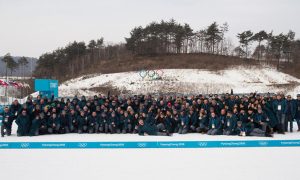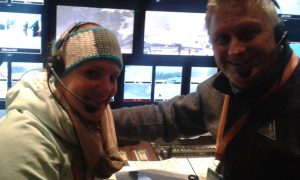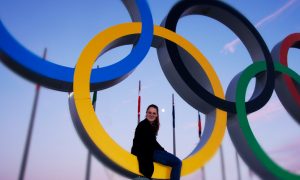Nothing but powder: Climbing the gnarly directing mountain with skiing specialist Vera Bichler

Vera Bichler at the Pyeongchang Winter Olympics 2018
Driven by ambition and a passion for sport, Vera Bichler, a freelance junior director, has become the first female director working in the sports department at Austrian national public broadcaster ORF.
In just a few years of pursuing her goal to becoming a full TV director, this native of Austria has been able to work at the London 2012 Olympics as an assistant director, the FIS Alpine World Ski Championships 2015 with the European Broadcasting Union (EBU), both the 2014 and 2018 Winter Olympics with ORF and Olympic Broadcasting Services (OBS) respectively, and much more.
Bichler comments: “In the sport department at ORF I am the very first woman to cover live sport as director. We do have quite a few women, who TV direct news and magazines at the ORF, but not in sports.”
Black run ambition
On how she has managed to achieve this feat, she says: “I think it is good mixture of being ambitious and loving what you are doing, as well as having a boss who believes in you and gives you chances to prove yourself.”
Bichler has also been shortlisted for the IBC 2019 Young Pioneer Award, which is running for the first time this year to recognise the brightest, newest talent in the industry.
She says on her career path: “I am currently working with one other girl and three other guys in a team of young TV sports directors at the ORF and we are pushing each other a lot, which is great but there is still a long way to go to becoming a full TV director. I was recently at the Rowing World Championships, which were taking place in Linz, Upper Austria, to assist my boss and understand how rowing can be covered. I think it is a process and you have to be patient with yourself. Gaining practise as an assistant is key.”
The need for education is aided by Bichler’s colleagues at ORF: “My boss helps by taking me, for instance, to camera inspections for ski races in summer months, so I get a better idea of how things are arranged for when we arrive in winter when everything is covered with snow. I do feel very privileged to get those chances and to still be able to learn a lot in this huge field.”
She continues: “I don’t think there is a better way to learn TV directing other than assisting and finally getting the chance to jump into the cold water and give it a shot. And I think it is crucial to have a deep understanding of the sport you are covering; you have to be passionate about it and interested in the story that lies behind the obvious. It is definitely more about being passionate about sports than which gender you are.
“However, you have to get the chance to prove yourself and I got this chance, which makes me very happy and I know that I am privileged. I won’t say it was easy, because it means a lot of sacrifices too; sport events mainly take place in the evening and on weekends, which means crazy working hours and a lot of travelling – which I love – but this sort of lifestyle certainly has an influence on your private life. I would never ever want to change though,” she says.

Vera Bichler was part of the huge team in charge of the OBS Olympic Transmission for Biathlon in Pyeongchang 2018
Avoiding a whiteout
Bichler’s career path began at university, where she decided to study journalism. She explains: “As I am a curious person, eager to learn and to make the most out of every new situation, journalism clearly was the field I wanted to become a professional in.”
Bichler had decided to study journalism after finishing school because she had ambitions become an author. However, after discovering that even well-known authors such as Dan Brown make a pittance of around 10 cents per sale of a book, she came up with a plan B.
She notes that while studying journalism she also, “focused on media management too, just to have a backup plan”.
Yet just four months into her bachelor degree in 2009, she began working as a freelancer at ORF in the sport department. Her initial role was as an assistant director in the Vienna headquarters doing mainly administrative work. She still works at ORF as the TV director’s assistant for the international feed for skiing.
She adds: “My main focus is on skiing, but I have covered a lot of football over the last year as well as some biathlons, Judo and handball, as well as volleyball and beach volleyball. When ski races are taking place outside of Austria, I am often sent there to add national content as a TV director; we take the international feed from the Norwegians, Swiss, French, and add our national content on with our camera teams, commentators, anchors, experts etc.
“I really love this work, because you can always bring in your own ideas, travel in a small team and get to know great places. I first travelled in this function in 2015. Before that I contributed to sports transmissions as a floor manager or graphic operator for handball, volleyball, football, table tennis and more, throughout Austria,” she says.
As a former Jiu-Jitsu World Champion, ORF has taken note and makes use of Bichler’s experience. She notes: “With my special focus on martial arts, I also edited and still edit some stories on national tournaments in Judo and Jiu-Jitsu, and recently got the permission to speak on air. I added some promotional trailers for upcoming sports events as well.
“As an assistant director at the ORF in the sport department, you can really do a lot of different things and I can clearly see my progress from the administrative side, as one of many assistants, making my way through several positions to now, where ORF has given me the chance to direct all matches from the Austrian Women’s soccer league, and even matches from the Woman’s Austrian national team,” Bichler says.

Vera Bichler and her boss at ORF, director Michael Koegler, working for the EBU at the FIS Alpine World Ski Championships 2015 in Vail and Beaver Creek in the US
Real world experience
On studying while working at ORF, Bichler was able to put her theoretical knowledge to work in the real world, as well as being able to pick the brains of her colleagues. “I had the chance to ask my older and more experienced colleagues to explain things and routines they were so used to doing.”
This work expanded into more opportunities. “When one of our most experienced TV directors at the ORF, Michael Koegler, asked me to work with him for the European Broadcasting Union to cover the FIS Alpine World Ski Championships 2015 in Vail and Beaver Creek in the US, I took the chance to broaden my horizon and work with an international crew. This was clearly my breakthrough,” she says.
Koegler helped Bichler get onto the career ladder, she adds: “I think I am very lucky, because my boss [Koegler] always saw past my age and gender and believed in my talent and ambition.
Commenting on Koegler, she adds: “I simply loved the way he could motivate people and build a new team out of so many different nations (Italians, French, Germans, Austrians, Swiss, Philippines, Americans…) with one goal; to make the best possible skiing transmission. He even was nominated for the Emmy in that year with his broadcasting crew and I was so proud being part of it and to contribute to this success.”
Shredding it
Fritz Melchert, Bichler’s boss at ORF in 2012, suggested she should work at the London 2012 Olympics as an assistant director. She says: “Never ever has there been a younger assistant director, so I thought I’ll give it a try, and really loved it. London is a great city and for me as a newbie I simply enjoyed working there and being part of the big Olympic family and spirit.
Martial arts has helped focus Bichler throughout her career. She explains: “I stopped studying for a year [after the 2012 Olympics], and focused on my (by then) full time job at the ORF and my training; I was in the Austrian national team for Jiu-Jitsu from 2006 till 2013. In that period of time I became World Champion in 2011 in Cali, Columbia and competed twice and the World Games; ‘the Olympic Games for non-Olympic sports,’ so to say. I realised that after this very last competition I have to watch out for other challenges and applied for the university of applied science in St. Poelten, Lower-Austria, to improve my (at that time) barely existing management skills.
“My studies were a great experience there, but what I loved most about it, was the ability to do a semester abroad at the CU Boulder University in Colorado, near Denver. There I had the chance to study and work for the EBU during the Ski Alpine World Championships in Vail and Beaver Creek. Since I already worked for the ORF as a host broadcaster in Schladming at the 2013 World Championships in skiing (and skiing is without doubt the major sport in Austria next to football,) this clearly was the next step; to work in an international environment. I learned a lot and really appreciate the positive and enthusiastic working environment Americans tend to have.”
Bichler was also given the opportunity to work at both the 2014 and 2018 Winter Olympics with ORF and OBS. She says: “I really liked working for the ORF in the IBC in Sochi, Russia, and in our own studio as a floor manager and editorial support for our anchors in 2014, but I have to say, working for OBS in 2018 in Pyeongchang, South Korea, was even bigger for me. I got the chance to travel there with Michael Koegler, who was in charge of the Biathlon transmissions. I worked as a graphic operator and assistant, got the chance to attend several meetings to get an idea of how this huge international company wants to see things covered in their way. Again, it was a great experience to work with so many different people from so many different countries with so many different mindsets – I learned a lot!”
As a freelance, Bichler is able to take on new opportunities as they arise; one instance of this is a job she began in summer working for Austrian media production company, West4Media, that is covering the America’s Cup in March 2021 as well as all the pre-events for this sailing race. She is working as a project coordinator to help the managing directors organising this huge event.
She says: “This job is a great opportunity for me to take one step back from live directing in order to widen my knowledge about TV production; until now I mainly focused on live TV directing, but I also have to think in other dimensions, such as what does it take to produce good TV coverage with regard to graphics, camera angles, distribution and communication methods? It is challenging and definitely a lot of fun as I can learn a lot.”
Further learning
Bichler has attended the HBS Broadcast Academy to improve her grasp of directing in sports outside of her comfort zone. “My boss suggested I do the Live Sports Production module in March 2018, and it simply was the best way to practice directing without live pressure and consequences. As the example football game was taped we could go back and forth, discussing in the groups why this cut made sense or wouldn’t make any sense and how situations could be solved in a better way. I really enjoyed my week there, learned a lot from John Watts, one of the greatest football directors worldwide, who didn’t get tired going through scenarios with us and discussing the pros and cons on and on.”

Vera Bichler in Sochi for the Winter Olympics 2014
“I did some smaller productions at ORF before the seminar but to be honest, I only felt really confident when it came to skiing. With every other sport, I was a little insecure. HBS Broadcast Academy helped me a lot to gain self-confidence and [to establish] a better routine in stressful situations.”
After completing the course, Bichler returned to work at ORF and her boss asked her to cover the Women’s soccer league in the upcoming season. This is, explains Bichler, “not a huge league here and there are only around 10 matches per season, but it is a great opportunity to get things started and developing a routine in live TV directing”.
She adds: “I decided to give it a shot, which I am not sure that I would have done without the seminar, because again – and this might be a female rather than a male issue – I tend to underestimate myself, whereas my male colleagues would never doubt their own skills.”
Ripper attitude
On challenges she has faced so far, Jiu-Jitsu has given her a strong basis for facing up to issues in the workplace, Bichler explains: “My biggest challenge was definitely to administrate my sports career as a martial artist competing for the Austrian national team, [while simultaneously] studying at university with the goal to finish with a degree, and working for Austria’s biggest media company. Those were rough years, but they taught me a lot.
“I think as I have always been used to a male environment due to my martial art background, I never felt as intimidated to prove myself in this environment as other women may have been. Also, I got lucky with my coaches in sports and bosses in my career, who always believed in me and turned me into the best version I could possibly be at that very moment. They pushed me further and told me not to be satisfied with the current status; you can always improve and get better. This attitude helps me in pretty much every situation in life,” she notes.
“I am pretty sure I wouldn’t be the person I am without Jiu-Jitsu. This may sound super dramatic, but it is true though,” says Bichler. “When I started martial arts, I was a clumsy, rather chubby girl with not a lot of self-esteem. Not only did I meet a lot of great people along my journey, I also got the chance to travel to great places while competing for the Austrian national team.”
As for how the martial art has influenced her attitude to directing, she adds: “I learned to stick through tough times; nothing is permanent, nothing is stable. If you want to get somewhere you have to go for it, 100%. So yeah, discipline would be one thing, but also patience (which I am still not very good at, but at least, I am improving ,) stamina and ambition. Never be confident with what you are currently having; always reach for the stars.”
The future for Bichler is bright and exciting. She concludes: “I am really looking forward to the America’s Cup and the challenges I will have to face on my way to New Zealand, but also, there are the Summer Olympics coming up in Tokyo in July 2020; that’s when I am about to turn 30, so there are a lot of great events ahead of me.”
